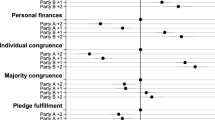Abstract
Several theories of voting behavior suggest that voters evaluate candidates in an election based on the candidates; past performance and future promise. There is a dispute in the theory and ambiguity in empirical evidence about which direction voters look when choosing candidates: do voters weigh past performance or future promise more heavily in the voting booth? This paper contributes empirical support to the prospective voting model by testing both retrospective and prospective voting in a pivotal case: the 1996 Taiwan presidential election. Taiwan's 1996 election represents the first popular election of the president from a field of candidates that included the long-ruling KMT party incumbent, Lee Tent-hui. In the Taiwan presidential election, voter evaluations of Lee's prospects for managing the economy in the future prove statistically significant as a predictor of voter choice. Voter evaluations of recent economic conditions do not appear closely related to voter choice. Voters; perceptions of the candidates; abilities to influence ethnic relations, domestic safety, and international security are better predictors of the vote than past ethnic relations or past security problems, even in the face of Communist China's pre-election aggression toward Taiwan.
Similar content being viewed by others
References
Achen, C.H. (1992). Social psychology, demographic variables, and linear regression: Breaking the iron triangle in voting research. Political Behavior14: 195-211.
Campbell, A., Converse, P.E., Miller, W.E. and Stokes, D.E. (1960). The American voter. New York: Wiley.
Downs, A. (1957). An economic theory of democracy. New York: Harper and Row.
Erikson, R.S. (1990). Economic conditions and the congressional vote: A review of the macrolevel evidence. American Journal of Political Science34: 373-399.
Erikson, R. (1989). Economic conditions and the presidential vote. American Political Science Review83: 567-576.
Fair, R.C. (1988). The effects of economic events on votes for the President: A 1984 update. Political Behavior10: 168-179.
Fair, R.C. (1978). The effect of economic events on votes for President. Review of Economics and Statistics60: 159-173.
Fiorina, M.P. (1981). Retrospective voting in American national elections. New Haven: Yale University Press.
Fiorina, M.P. (1992). Divided government. New York: Macmillan.
Hibbs, D.A., Jr. (1987). The American political economy. Cambridge: Harvard University Press.
Hsieh, J.F.-s. (1993). Parliamentarism vs. presidentialism: Constitutional choice in the Republic of China on Taiwan. Chinese Political Science Review21: 173-202.
Hsieh, J.F.-s., Lacy, D. and Niou, E.M.S. (1996). Economic voting in the 1994 Taiwan elections. American Asian Review14: 51-70.
Hwang, S.-D. (1994). Economic conditions and voters' choices (in Chinese). Soochow Journal of Political Science3: 97-123.
Jacobson, G. (1990). The electoral origins of divided government. San Francisco: Westview Press.
Key, V.O., Jr. (1966). The responsible electorate. Harvard University Press.
Kiewiet, D.R. (1983). Macroeconomic and micropolitics. Chicago: University of Chicago Press.
Kinder, D.R. and Kiewiet, R.D. (1981). Sociotropic politics: The American case. British Journal of Political Science11: 129-161.
Lewis-Beck, M.S. (1990). Economics and elections. Ann Arbor: University of Michigan Press.
MacKuen, M.B., Erikson, R.S. and Stimson, J.A. (1992). Peasants or bankers: The American Electorate and the U.S. economy. American Political Science Review86: 597-611. Tufte, E.R. (1978). Political control of the economy. Princeton: Princeton University Press.
Author information
Authors and Affiliations
Rights and permissions
About this article
Cite this article
Hsieh, J.Fs., Lacy, D. & Niou, E.M. Retrospective and prospective voting in a one-party-dominant democracy: Taiwan's 1996 presidential election. Public Choice 97, 383–399 (1998). https://doi.org/10.1023/A:1005062527921
Issue Date:
DOI: https://doi.org/10.1023/A:1005062527921




